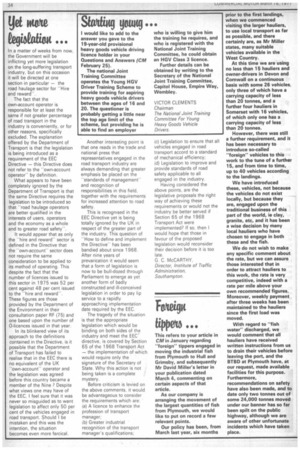get mete
Page 36

If you've noticed an error in this article please click here to report it so we can fix it.
tegiatating • • •
In a matter of weeks from now, the Government will be inflicting yet more legislation on the long-suffering transport industry, but on this occasion it will be directed at one section in particular — the road haulage sector for "Hire and reward".
The fact that the own-account operator is responsible for at least the same if not greater percentage of road transport in the industry is conveniently, or for other reasons, specifically excluded, The explanation offered by the Department of Transport is that the legislation is being introduced as a requirement of the EEC Directive — this Directive does not refer to the "own-account operator" by definition,
What appears to have been completely ignored by the Department of Transport is that the same Directive requires the legislation to be introduced so that -road haulage operators are better qualified in the interests of users, operators and the economy as a whole and to greater road safety".
It would appear that as only the -hire and reward'' sector is defined in the Directive that the "own-account" sector does not require the same consideration to be applied to' its method of operating. This despite the fact that the number of licences issued to this sector in 1975 was 52 per cent against 48 per cent issued to the "hire and reward". These figures are those provided by the Department of the Environment in their consultation paper RF (75) and one based upon the number of 0-licences issued in that year.
In its blinkered view of its approach to the definitions contained in the Directive, is it possible that the Department of Transport has failed to realise that in the EEC there is no equivalent of the UK "own-account" operator and the legislation was agreed before this country became a member of the Nine ? Despite what views one may have of the EEC, I feel sure that it was never so misguided as to want legislation to affect only 50 per cent of the vehicles engaged in road transport. Should I be mistaken and this was the intention, the situation becomes even more farcical. Another interesting point is that one reads in the trade and national press that representatives engaged in the road transport industry are always demanding that greater emphasis be placed on the "'standards of management" and recognition of responsibilities in this field, together with the requirements for increased attention to road safety.
This is recognised in the EEC Directive yet is being totally ignored by the UK in respect of the greater part of the industry. This question of "How to define and implement the Directive" has been bandied about since 1968. After nine years of prevarication it would seem that a form of legislation is now to be bull-dozed through Parliament to emerge as yet another form of badly constructed and ill-conceived legislation in order to pay lip service to a rapidly approaching implementation date required by the EEC.
The tragedy of the situation is that the appropriate legislation which would be binding on both sides of the industry and meet the EEC' directive, is covered by Section 65 of the 1968 Transport Act — the implementation of which would require only the signature of the Secretary of State. Why this action is not being taken is a complete mystery.
Before criticism is levied on the above comments, it would be advantageous to consider the requirements which are.
(a) A hcence to enhance the profession of transport manager: (b) Greater industrial recognition of the transport manager's qualifications. (c) Legislation to ensure that all vehicles engaged in road transport accord to a standard of mechanical efficiency; (d) Legislation to improve and provide standards of road safety applicable to all engaged in the industry.
Having considered the above points, are the legislative proposals the right way of achieving these requirements or would not the industry be better served if Section 65 of the 1968 Transport Act were implemented? If so, then I would hope that those in favour of the proposed legislation would reconsider their decision before it is too late G. C. McCARTHY, Director, Institute of Traffic Administration, Southampton.




























































































































